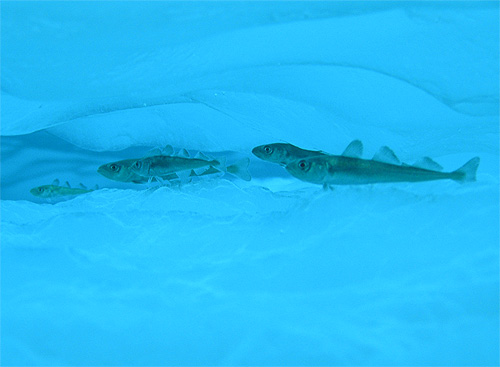
Major Arctic Ocean climate change symposium planned
November 05, 2012
The steady loss of arctic sea ice in recent decades is perhaps the most obvious sign of a warming planet. As of mid-September, Arctic Ocean sea ice covered just 1.32 million square miles of ocean - less than half the 1979-to-date average, when satellite measurements began. Far less obvious is how individual marine species - from arctic cod that live just below and sometimes within the sea ice, to seals, whales, polar bears and ultimately humans - will respond to the loss of sea ice and other consequences of a warmer Arctic.
Arctic cod beneath the Arctic Ocean sea ice, Canada Basin north of Barrow, Alaska.
This symposium will bring scientists from around the world to share their research on how arctic marine ecosystems are responding to climate change. Scientists and other presenters are asked to submit their abstracts before November 30, 2012. Among the topics are
The symposium is organized by Alaska Sea Grant and guided by steering committee members from NOAA Alaska Fisheries Science Center, UAF School of Fisheries and Ocean Sciences, Pew Environment Group, U.S. Arctic Research Commission, Canada Department of Fisheries and Oceans, Alaska Department of Fish and Game, North Pacific Fishery Management Council, North Pacific Research Board, and the Institute of Marine Research in Norway. Each summer, Arctic Ocean sea ice melts under nearly 24 hours of daylight. Scientists say the annual ice melt now begins earlier and lasts longer, leading to dramatic sea ice losses by the end of summer.
Source of News:
E-mail your news &
photos to editor@sitnews.us
|
||
